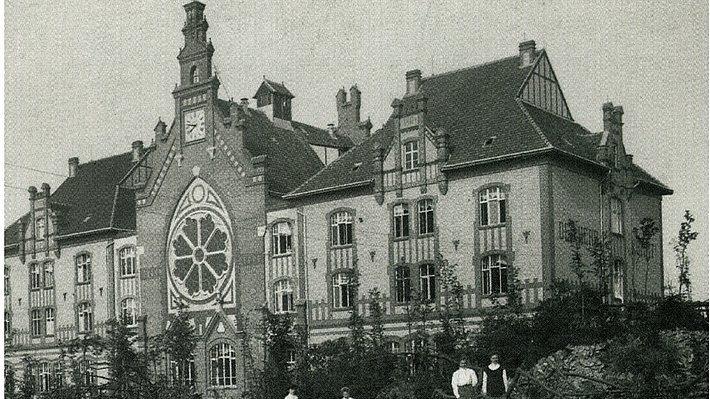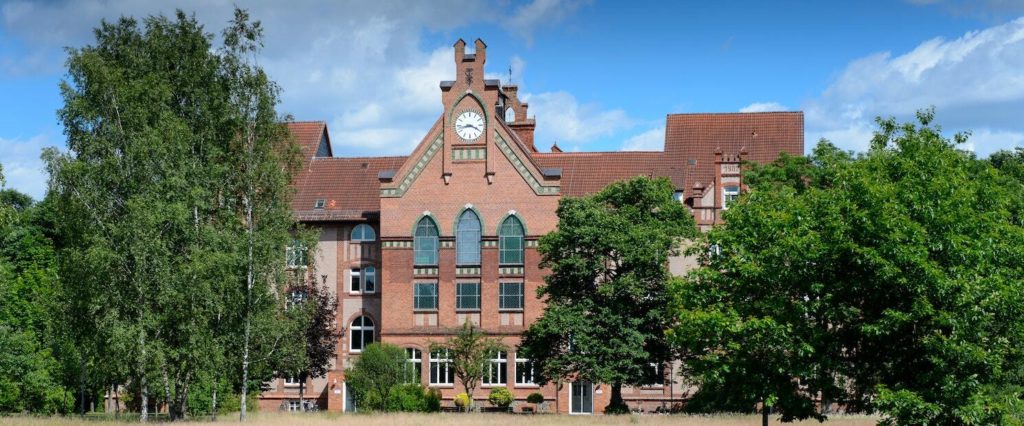
Theologische Hochschule Friedensau, also known as Friedensau Adventist University, will celebrate its 125th anniversary in 2024. Founded as a missionary and industrial school in 1899, the university today continues its tradition as a state-recognized higher-education institution under the management of the Seventh-day Adventist Church.
A number of special anniversary events will be held at Friedensau throughout the year to mark the occasion. The opening event of the celebrations took place on January 14 at the university library. An expert on the history of Friedensau, Johannes Hartlapp, who is a church historian at Friedensau Adventist University, read some sections from the Friedensau Chronicle, a school history that is currently being written.
On February 11, the university library will open its doors to visitors for the 125 Years of Friedensau exhibition. Large display walls, divided into decades, will show the growth and changes at Friedensau from its foundation to the present day.

History of Friedensau
On November 19, 1899, the institution that preceded the university, the Industry and Mission School, commenced operations with just seven students in very basic conditions. The school was housed in an old mill on the Ihle River, a building mentioned for the first time in 1306.
The next 10 years saw the construction of an ensemble of large teaching and residential buildings that still define the look of the campus today. A sanatorium, workshops, and a food factory were also built, in line with the school’s wholistic pedagogical model. These facilities provided both a practical teaching opportunity and a way for students to earn money. Before World War I, up to 250 people per year made use of the training opportunities offered.
During World War I, the War Ministry set up a military hospital in the facilities. It was not until 1919 that normal training could resume, and in subsequent years, it expanded with new courses, including home economics, a preparatory school for nursing, secondary-level courses in science and technology, business, and child-care courses. In 1923 the name of the institution was changed to Friedensau Mission Seminary. In 1930, the seminary received state accreditation from the administrative district officer of Magdeburg for its home economics and business courses.
The Nazi period brought many restrictions, culminating in the closing of the seminary during World War II. Again, the teaching buildings were used for the care of sick and injured soldiers, first from the Wehrmacht, and from 1945 on, by the Soviet army.
Through the intercession of the minister president of Saxony-Anhalt, Erhard Hübener, the Soviet military administration allowed the school to reopen in 1947. This made the Friedensau seminary the first and only church training facility to be allowed to resume its teaching operations in the Soviet occupation zone.
During the East Germany period, the communist party government allowed training of church employees only. In addition to training for pastors, there were one-year courses for deacons. In 1981, the high standards and quality of the training led to the new name, Friedensau Theological Seminary. Two years later, the General Conference of Seventh-day Adventists accredited the seminary as a senior college. Starting in the 1980s, students from other socialist states of Eastern Europe and Africa were allowed to train as pastors at Friedensau.
On September 15, 1990, the Theological Seminary became a state-accredited university following a decision by the Council of Ministers. Later, a School of Social Sciences was established alongside the School of Theology, which has offered diploma and master’s courses in theology since 1992.
Today, Friedensau Adventist University is an academically oriented, church-run university that awards university degrees. The School of Social Sciences and School of Theology offer 10 undergraduate and graduate degrees. It is an established place of scholarship and has research collaborations with institutions on several continents.
The original version of this story was posted on the Inter-European Division news site.